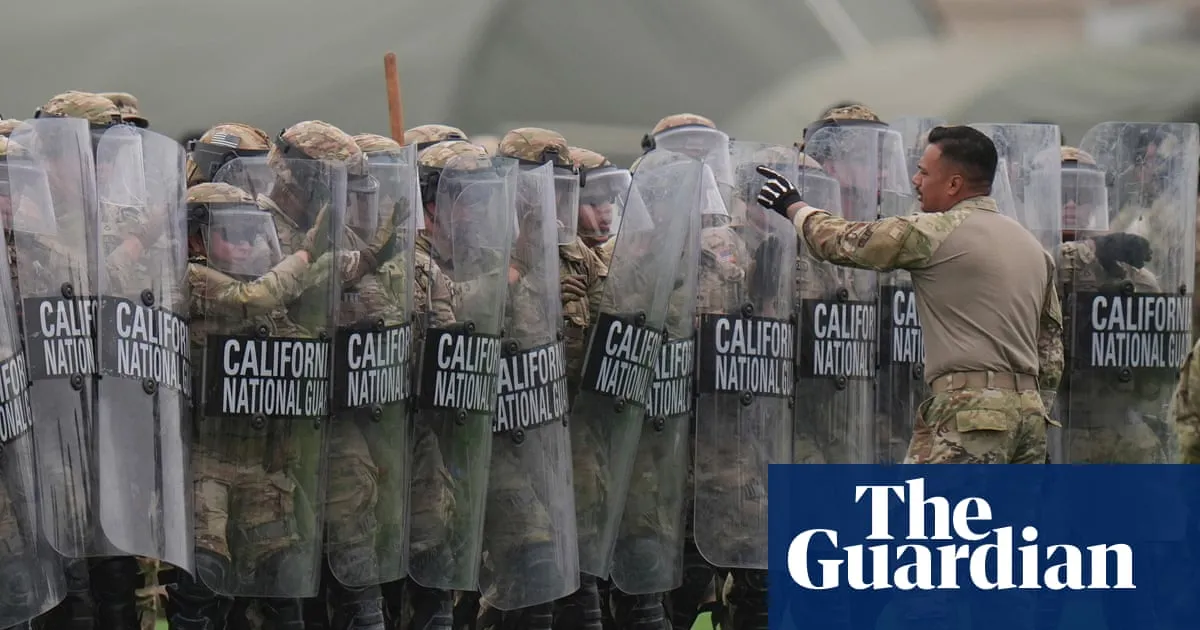
In recent days, California National Guard troops and Marines have been deployed to Los Angeles to help restore order following extensive protests against the Trump administration. However, many service members have expressed deep dissatisfaction with their assignments, fearing they are being used as pawns in a political conflict they do not wish to be part of. According to three advocacy organizations representing military families, dozens of affected service members have voiced discomfort over being drawn into domestic policing operations that fall outside their typical roles.
Sarah Streyder, a representative of the Secure Families Initiative, which advocates for military spouses, children, and veterans, voiced the prevailing sentiment among service members: “Deploying military force against our own communities isn’t the kind of national security we signed up for.” Families are not only worried about their loved ones’ safety, but also about how their service is being utilized to justify actions that may not align with their values.
Chris Purdy from the Chamberlain Network, an organization dedicated to empowering veterans in protecting democracy, reported similar sentiments from multiple National Guard members. He noted, “Morale is not great, is the quote I keep hearing.” Unfortunately, neither the California National Guard nor the Marines have responded to requests for comment on this issue.
President Trump has controversially ordered 4,000 National Guard members to Los Angeles without the consent of California Governor Gavin Newsom, claiming that the city risked being “obliterated” by violent protests. Additionally, he activated 700 Marines from the Twentynine Palms base, branding Los Angeles a “trash heap” in danger of burning down. However, the reality of the situation is that the anti-Trump protests have remained largely peaceful, confined to a few blocks around federal buildings, despite the heightened military presence.
In response to instances of violence and vandalism during the protests, the Los Angeles Police Department has made hundreds of arrests and implemented a night-time curfew. Notably, the National Guard's presence at the largest demonstration since Trump's intervention was minimal, as they were largely contained by police vehicles and played little role in crowd control.
Reports of poor living conditions for the deployed troops have surfaced. A widely circulated photograph confirmed by the Pentagon showed National Guard members sleeping on a concrete loading dock floor without bedding. The San Francisco Chronicle also reported that troops arrived without adequate lodging, portable toilets, or funds for food and water, raising concerns about their well-being.
Recent polls conducted by YouGov indicate public disapproval of both the National Guard and Marine deployments, along with discontent regarding Trump’s immigration policies. A Washington Post poll revealed similar findings, although with slightly narrower margins. While active service members are legally prohibited from publicly discussing their assignments, Streyder indicated that many complaints have been relayed through their families. One National Guard member even described their current mission as “shitty” compared to previous, more community-oriented assignments like wildfire relief and vaccination outreach during the COVID-19 pandemic.
Janessa Goldbeck, a Marine Corps veteran leading the Vet Voice Foundation, echoed these concerns, noting that many troops feel they are being used as political tools, straining the perception that they remain apolitical. Goldbeck remarked that many service members believe the situation does not warrant the deployment of Marines and worry they may be set up for failure.
Advocates stress the importance of separating personal political affiliations of service members from the overarching principle that military personnel should not engage in politically motivated missions that blur the lines of responsibility with civilian law enforcement. Streyder emphasized, “The military is a tool that should be used as a last resort, not a first response.”
This discontent may extend beyond California. In Texas, Governor Greg Abbott recently called out the National Guard in cities expecting anti-Trump protests, and there is a history of guardsmen feeling misused in similar situations. For instance, after Abbott requisitioned the guard in 2021 for controversial border policing operations, numerous guardsmen expressed dissatisfaction and faced mental health challenges, illustrating the potential repercussions of such deployments.
The operations in Los Angeles also raise safety concerns regarding the collaboration between military personnel and domestic police officers. Advocates highlight the inherent complications arising from their differing training and communication styles in emergency situations. A notable incident during the 1992 Los Angeles riots exemplified these dangers, highlighting the catastrophic potential when military and police fail to operate with clear communication.
Streyder and other advocates firmly believe in maintaining the separation between military and domestic law enforcement roles. “Domestic law enforcement and the military are entirely separate functions,” she stated, emphasizing the importance of honoring this distinction for the safety and effectiveness of both entities.